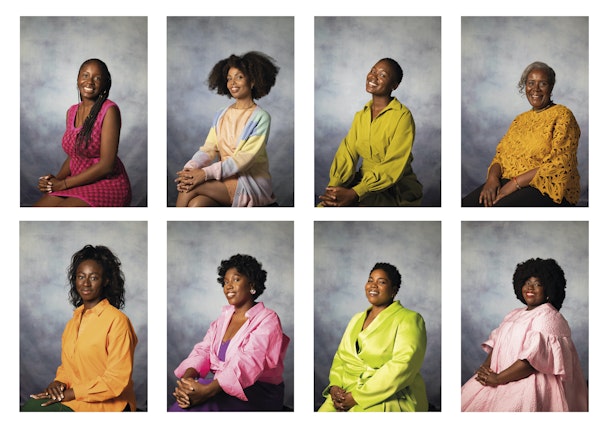How Dove reclaimed school picture day in an inspiring campaign
Dove and The Romans have won the Consumer Goods and Storytelling categories at The Drum Awards for PR. Here is the award-winning case study.

Check out the award-winning campaign
Dove has a long history of empowering women to embrace their natural beauty and, in doing so, prioritise the self-esteem that comes from loving yourself, just as you are. But how can you love yourself as you are when individuals, schools, public institutions and places of work are still able to openly and legally discriminate against you because of how you choose to wear your hair?
Author Stephanie Yeboah recently posted, “When I was younger, my head of school forced everyone to shave their afros off because they deemed them unkempt, unruly and not smart looking.” In fact, Dove research has found that black children experience race-based hair discrimination from as early as five years old. Those with afro or textured hair can too often attract unwanted touch, unwelcome remarks, and suffer from fetishization, microagressions, all the way through to outright racist school and company policies.
Dove is therefore on a mission to end race-based hair discrimination and enable women everywhere to embrace their natural beauty. Our brief: shine a light on this little-understood, rarely written about problem, and campaign for its long overdue end.
STRATEGY
"No Irish, No Blacks, No Dogs” – the famous slogan written in windows of accommodation for rent in post-war London, is utterly shocking to read in modern, multi-cultural Britain. However, in the UK there are thousands of work and school dress codes that have the exact same implication. “Afro-style” hair is repeatedly singled out for special treatment, often couched in phrases such as “must be of reasonable size and length” or even simply “no dreadlocks”.
Q: But what’s reasonable size? And who determines what constitutes reasonable length? A: It’s obviously a white man, right?
Not only do these policies dehumanise and stigmatise but the act of sending children home from school because their hair doesn’t conform to a bizarre set of homogenised norms arbitrarily decided by some headteacher needlessly damages academic careers and impacts the future potential of black children. We should all be outraged. And so, when it came to our target audience, we definitely weren’t simply talking to a black audience: we needed to shout from the rooftops and create a national sense of astonishment and fury.
When it came to creating fury, our strategy was simple: focus on school. A place that is meant to be the safest of spaces and yet for some pupils it's anything but. And, when it comes to school and the way you look, there’s one annual calendar moment that’s universally understood…
THE IDEA
School photo day. The yearly moment when an image is created for perpetuity, something to send to the grandparents and place with pride on the mantelpiece. In a world of Instagram and digital photos, for many, the school photo is the only actual real-world physical photo they get taken in an entire year. We won the Dove account after fielding a black pitch team. And they were unanimous in their antipathy to school photo day.
“I still feel the trauma.” “I fucking hated it.” “I just never went.” Such an intense visceral reaction warranted further exploration. So we commissioned a really chunky piece of research to get under the skin of the subject. The results were astonishing. 84% of black and mixed-heritage women with afro or textured hair felt the need to alter their authentic or natural hairstyle for school with almost a third (30%) going out of their way to change it specifically for school picture day so they could fit in with the rest of their class. Over half (51%) agreed they felt worried about how to style their hair for the day. And the killer: 28% skipped school picture day altogether due to anxiousness around race-based hair discrimination.
We couldn’t believe it. It felt like they’d been robbed, actively deprived of something that every other child in the country takes for complete granted. Memories, stolen.
And so, we located and recruited a cohort of black women that had experienced race-based hair discrimination in their school days. Working with the exceptionally talented black film director Ron Timehin, we shot a moving film in which eight affected women share their stories about the long-lasting hold this untold form of racism has had on their lives. The film sees the women have their school pictures retaken, this time wearing their hair as they have chosen, expressing beauty on their terms and showing up as their most authentic selves. The film captures the raw and emotional moment as each woman sees their new school picture for the first time, reclaiming the confidence they didn’t have at school. The moving film reinforces the need for change, as almost a third of black women have been sent home from school at least once due to an issue with how they had styled their hair.
Author Emma Daviri, who appears in the film, commented: “We still have a long way to go when it comes to understanding Black hair, how it grows and the significance of its difference when compared to European hair textures. These differences can result in varying styling practices and techniques for black or mixed-heritage students, and it’s important for teachers and those in positions of power to be aware of this, so those pupils aren’t penalised for how they wear their hair. This is why we are campaigning to amend the UK Equality Act to explicitly protect afro and textured hair, to put an end to race-based hair discrimination in schools.”
RESULTS
We landed 50+ sizeable pieces of coverage in the UK, across national and broadcast. It started a widespread national debate, online and IRL. You will have seen it. But who cares about coverage when you can claim actual change?! Our research and campaign were directly cited by ministers as contributing to the issuance of new government rules for schools in the UK in October 2022, delivered via the Equalities and Human Rights Commission and endorsed by the All Party Parliamentary Group for Race Equality In Education. It states that “pupils should not be stopped from wearing their hair in natural afro styles at school” and that “any existing uniform and appearance policies that ban certain hairstyles, without the possibility for exceptions to be made on racial grounds, are unlawful.”

